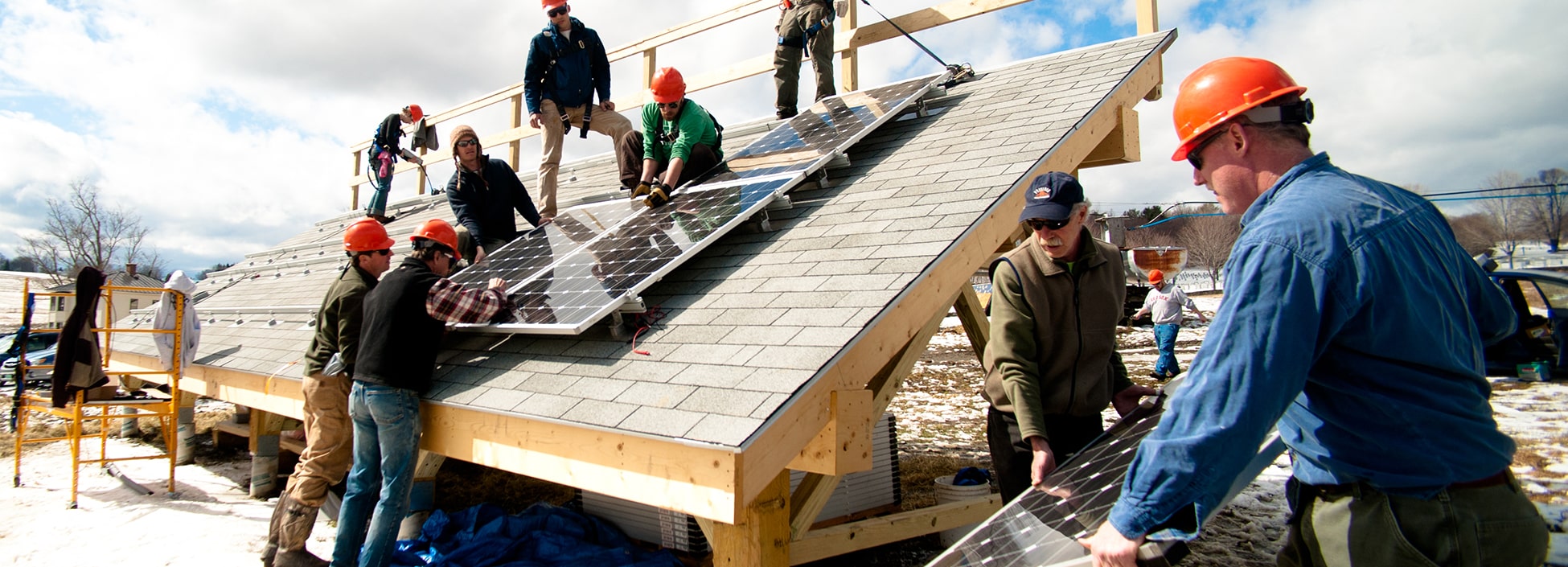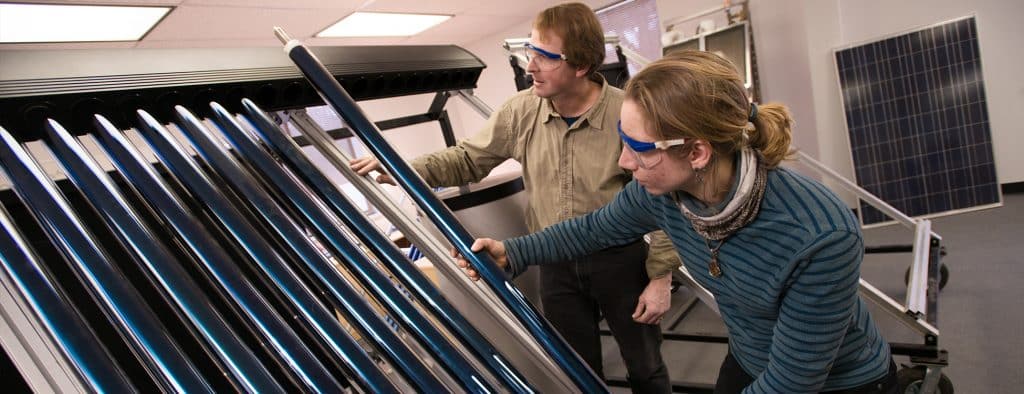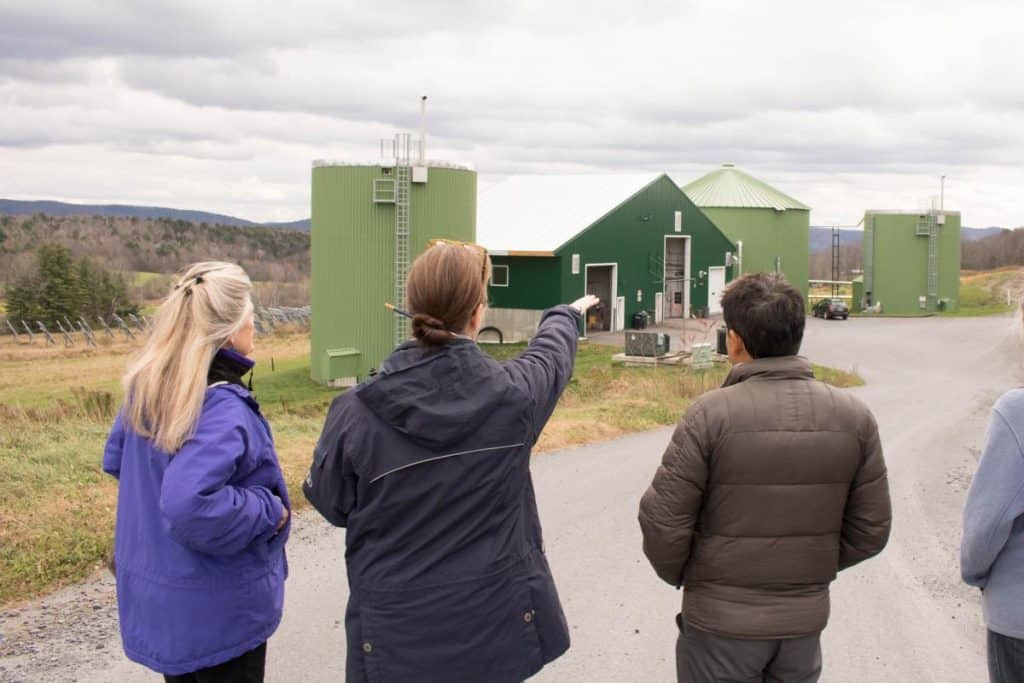Today, the U.S. Department of Energy’s (DOE) Office of Energy Efficiency and Renewable Energy (EERE) awarded its first-ever Zero Energy Design Designation (ZEDD) seal of recognition to 17 leading educational programs that are preparing tomorrow’s architectural and engineering leaders to design and build the most sustainable buildings possible. This new DOE designation distinguishes post-secondary academic programs that impart the best…
Renewable Energy
If you’re looking for an industry that’s growing, the renewable energy industry is one that continues to expand and diversify. At this rate, many analysts predict that the global clean energy economy will top $1 trillion by 2020. Along with a complete Renewable Energy Lab, students have access to a variety of renewable energy installations that provide power to the Randolph Center campus like the Anaerobic Biodigester, 10kW wind turbine and 500kW solar array. Technologies covered include solar PV, renewable heating, wind, and biomass.
Our graduates pursue careers as systems designers, systems technicians, field operations technologists, technical managers, and sales technicians employed by renewable energy manufacturers; energy project developers; manufacturing and technology companies; and energy consulting and management firms.
CCV students: Our articulation agreement with CCV guarantees admission for CCV graduates who complete the AS in STEM Studies with a 2.0 or higher GPA, provided the student has completed a minimum of 60 pre-approved transfer credits. Please contact our Admissions office for specific degree requirements.
Minimum Degree Requirements RENA student with a Bachelor of Science in Renewable Energy will be able to:
- Apply knowledge, techniques, skills, and modern tools of mathematics, science, engineering, and technology to solve broadly defined problems appropriate to renewable energy
- Design systems, components, or processes meeting specified needs for broadly defined problems appropriate to renewable energy
- Apply written, oral, and graphical communication in broadly defined technical and non-technical environments and identify and use appropriate technical literature
- Conduct standard tests, measurements, and experiments, then analyze and interpret results to improve processes
- Function effectively as a member as well as a leader on technical teams
Educational objectives that are demonstrated during their workforce careers include:
- Engineering skills: develop a successful career in design, specification, installation, testing, operation, maintenance, sales, or documentation of renewable energy systems
- Professional skills: employ strong communication and teamwork skills and participate productively on professional teams of engineers, technicians, managers, and skilled production workers
- Design skills: utilize technical knowledge and skills to effectively design, fabricate, manufacture, and maintain renewable energy systems
Innovation skills: continuously develop as a professional; adapt and stay current in their field
Minimum degree requirements are listed on the overview. The student, in consultation with their advisor, may develop a sequence of courses that best meets their pace, experience, and needs while still satisfying all degree requirements, including minimum required credits and required program courses. A typical curriculum is shown here.
Curriculum Details
-
fall Semester
- as Required
- MEC 2150 Introduction to Solar Photovoltaic Technology
- MEC 3010 Wind Power
- Renewable Energy Track
- ARE 2031 Environmental Systems I
- ARE 3050 Fundamentals of Fluids & Thermodynamics
- XXX XXXX Elective
- Architectural Engineering Track
- ARE 3050 Fundamentals of Fluids & Thermodynamics
- BIO 1020 Introduction to Environmental Biology
- BUS 2020 Principles of Management
- ELT 2071 Basic Electricity
- Civil Engineering Track
- ARE 2031 Environmental Systems I
- ARE 3050 Fundamentals of Fluids & Thermodynamics
- BUS 2020 Principles of Management
- ELT 2071 Basic Electricity
- PHY 1042 Physics II
- Electrical Engineering Track
- ARE 2031 Environmental Systems I
- ARE 3050 Fundamentals of Fluids & Thermodynamics
- BIO 1020 Introduction to Environmental Biology
- BUS 2020 Principles of Management
- Mechanical Engineering Track
- ARE 2031 Environmental Systems I
- BIO 1020 Introduction to Environmental Biology
- BUS 2020 Principles of Management
-
spring Semester
- MAT 2021 Statistics
- as Required
- MEC 3040 Bioenergy
- MEC 3170 Renewable Energy Heating
- Renewable Energy Track
- ARE 2032 Environmental Systems II
- ELE XXXX AH/SS elective
- Architectural Engineering Track
- CHE 1031 General Chemistry I
- SSC 2030 Energy Systems & Sustainability
- Civil Engineering Track
- ARE 2032 Environmental Systems II
- SSC 2030 Energy Systems & Sustainability
- Electrical/Mechanical Engineering Track
- ARE 2032 Environmental Systems II
- CHE 1031 General Chemistry I
- SSC 2030 Energy Systems & Sustainability
-
fall Semester
- ARE 4020 Architectural Engineering Management
- ELE XXXX AH/SS elective
- MEC 4120 Renewable Energy Modeling
- MEC 4802 MEC Internship Review
- Select One
- BUS 3150 Production & Operations Management
- BUS 3250 Organizational Behavior & Management
- as Required
- MEC 2150 Introduction to Solar Photovoltaic Technology
- MEC 3010 Wind Power
Job Projections
685,000
Projected Job Openings for Solar Energy Installation Managers, 2019-2029 (source O*Net Online).
National data: Job openings for all occupations (source BLS).
Student Stories
Student Stories
Devin Tingle
- VTC has empowered me to become a leader
- Each day I'm challenged and supported to be my best
- It ended up being the perfect opportunity
news
-
28Sep
-
27SepRead more
GlobalFoundries Inc. (GF) (NASDAQ: GFS), a global leader in feature-rich semiconductor manufacturing, announces its first scholarship program for students at Vermont Tech. The GF Scholarship Program will offer an annual $5,000 scholarship and a paid summer internship to three selected candidates from Vermont Tech’s Mechanical/Manufacturing Engineering Technology, and/or Electrical/Electromechanical Engineering Degree, and/or Diesel, and/or Automotive Technology Program. “Vermont Tech graduates…
-
17MayRead more
Vermont State University, the first statewide, hybrid higher education institution in the United States, launched its unified brand identity and logo during a live virtual broadcast today. The unveiling is a major milestone in a transformation process unifying three institutions – Castleton University, Northern Vermont University, and Vermont Technical College. Sixteen months ago, the Vermont State Colleges System initiated a…




